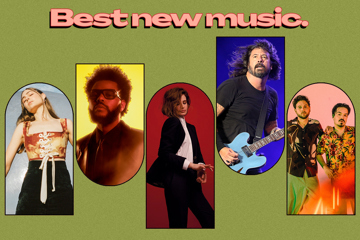On People Thinking Pop Music Is Dumb Or Vapid
"I think sometimes with pop production people can easily write you off, like, 'Ugh, this music is dumb, there isn't 43 guitar tracks..."

Back in 2013 erstwhile indie-rock darlings Tegan & Sara's seventh album Heartthrob found them catapulting from their long-held tenure in the alternative realms defiantly into the mainstream — the synth-heavy collection debuted at #3 on the Billboard 200, and went Gold in their native Canada — but most importantly it found the twin sisters totally at ease in their new surroundings, proving equally adept at doling out pop hooks and earworm melodies as they were at crafting heart-on-sleeve guitar anthems.
Now their follow-up long-player Love You To Death picks right up where Heartthrob left off, once again enlisting producer Greg Kurstin (Adele, Sia) to help concoct a serving of ridiculously catchy synth-pop that exhibits a strong '80s vibe despite being largely constructed on '90s keyboards.
"When we were in the indie-rock world sometimes people would say, 'Ugh, they're so catchy' — like it was annoying to be catchy — but in the pop world it's like if you don't have hooks you have nothing."
"It's funny," Sara Quin smiles, "because someone asked me the other day the differences between being in the alternative indie-rock world and the pop world and I was saying that when we were in the indie-rock world sometimes people would say, 'Ugh, they're so catchy' — like it was annoying to be catchy — but in the pop world it's like if you don't have hooks you have nothing. That's the golden ticket, so I feel like we're amongst our people now, with the hook masters!"
Don't miss a beat with our FREE daily newsletter
Quin explains that the sonic shift, which seems so seismic when contrasting their current music against their early fare, was actually quite a natural progression.
"I think sometimes for sound bites it's easier to just say, 'Yes, it was a choice we made, we wanted to move into the pop world,' but I think that the more honest answer is that it was a transition over a long period of time," she reflects. "I grew up playing piano and took theory and that was always more my instrument, but the guitar was very era-specific: I was a teenager in the 1990s and everyone played guitar. Everybody was in a band and everyone wanted to sound like Nirvana or The Pixies, so I think at some point I've just naturally gravitated back towards the piano and playing keyboard. I understand that better than I do the guitar, and I think that naturally led us into making music that was able to reveal our pop leanings.
"And in terms of production and what was happening in the pop world I was just more interested in it, and it was just a natural evolution to get back into that game. I don't miss the guitar but I'm not saying goodbye to it forever, it's just sitting gathering dust in my office."
One thing that hasn't changed in the Tegan & Sara canon is the emotional heft of their lyrics, which remain intensely personal and forthright despite the change in their musical surroundings.
"I think for us the record took on this theme of identity," Quin tells. "We've always been this band that people would say, 'Oh, it seems like you're always getting dumped, you guys are real underdogs, you're always getting your hearts broken!' So I felt personally challenged to try and think, 'Ok, how do I sing about the other side of that?' Because I've certainly been on the other end of a break-up in a relationship — I've certainly walked away from things and had to break up with people, and I've definitely had to set boundaries and go out on my own, even with Tegan. Even though we were in a band and we were twins and there was sort of an innate connection, there was also almost like a primal need to be on my own and be independent.
"There's a few songs on the record that touch on that time when I really felt like I almost had to destroy or dismantle that relationship and that connection and then build it back up again as an adult. So I think this record is definitely a bit darker than Heartthrob was — our previous pop album — but I think the combo of the pop production and then the lyrical content makes it something sorta unique in the pop world.
"We really made an effort to be emotional. I think sometimes with pop production people can easily write you off, like, 'Ugh, this music is dumb, there isn't 43 guitar tracks and a symphony and a dog crying in the background so it must be dumb or vapid or whatever,' but I think for us it was about how do we use this production that we are very enthusiastic about and interested in and also still make songs that feel really heart-wrenching and have depth."







